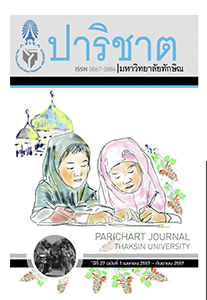Bumiputera: Racial policies in Malaysia
Main Article Content
Abstract
นโยบายภูมิบุตรา (Bumiputera) 2 เป็นนโยบายที่มีลักษณะของการ ให้สิทธิพิเศษบางประการกับชาวมลายูและชนพื้นเมืองเดิม ตามที่มีบัญญัติไว้ ในรัฐธรรมนูญของสหพันธรัฐมาเลเซียเพื่อเป็นหลักประกันทางด้านสังคมและ เศรษฐกิจของประชากรในกลุ่มที่เรียกว่า ภูมิบุตรา ซึ่งประกอบด้วยชาวมลายู และชนพื้นเมืองเดิม รัฐบาลมาเลเซียภายใต้การนำของพรรคแนวร่วมแห่งชาติ (National Front) มองว่าสถานะทางเศรษฐกิจ ของกลุ่มภูมิบุตรายังอยู่ในระดับ ที่ต่ำกว่ากลุ่มประชากรอื่นๆ จึงยังคงให้การสนับสนุนนโยบายดัง กล่าวนี้ เพราะ สำหรับพรรคแนวร่วมแห่งชาติแล้วนโยบายภูมิบุตรายังคงมีนัยสำคัญต่อการ ครองตำแหน่งในการบริหารประเทศ เนื่องจากกลุ่มุภูมิบุตราเป็นประชากรส่วน ใหญ่ของประเทศซึ่งมีผลต่อการเลือกตั้งเข้ามาเป็นรัฐบาล จนอาจกล่าวได้ว่า ประชากรกลุ่มนี้เป็นฐานเสียงสำคัญ ของพรรคแนวร่วมแห่งชาติซึ่งพรรคจะต้อง ให้ความสำคัญ จากผลการเลือกตั้งในระยะสองสมัยที่ผ่านมาในปี 2008 และ ปี 2013 ปรากฏชัดถึงความเปลี่ยนแปลงทางการเมืองมาเลเซียที่น่าสนใจคือ พรรคแนวร่วมแห่งชาติซึ่งเป็นรัฐบาลปกครองมาเลเซียมากว่า 50 ปีได้รับ คะแนนเสียงสนับสนุนน้อยลงจนไม่สามารถครอบครองที่นั่งส่วนใหญ่ในสภา ได้อย่างที่เคยเป็นมา สะท้อนให้เห็นถึงความนิยมที่ลดลงต่อพรรคแนวร่วมแห่ง ชาติอย่างต่อเนื่อง และสาเหตุประการหนึ่งก็มีปัจจัยมาจากความไม่พอใจต่อ การดำเนินนโยบายภูมิบุตราเพราะเป็นการเอื้อประโยชน์อย่างไม่เป็นธรรม และ ไม่สอดคล้องกับแนวทางการปกครองในระบอบประชาธิปไตย ในขณะที่ชาว มาเลเซียในปัจจุบันจำนวนไม่น้อยเริ่มให้ความสำคัญกับการเมืองที่ปราศจากการยึดติดทางชาติพันธ์ุ หรือนโยบายเชื้อชาตินิยม และมีแนวโน้มทที่จะสนับสนุน พรรคการเมือง ฝ่ายค้านซึ่งชูนโยบายทางสายกลางที่ไม่คำนึงถึงเชื้อชาติ ทั้งนี้ ถึงแม้ว่ารัฐบาลมาเลเซียจะได้ พยายามแก้ไขปัญหาความเหลื่อมล้ำทางสังคมและเศรษฐกิจของคนทั้งสามเชื้อชาติผ่าน นโยบายต่าง ๆ ตลอดมา เพื่อปรับโครงสร้างทางสังคมใหม่และกระตุ้นการขยายตัวทาง เศรษฐกิจอย่างยั่งยืนและเท่าเทียม แต่กลับไม่ประสบผลสำเร็จเท่าที่ควรทำให้นโยบาย ภูมิบุตราจึงนับเป็นนโยบายหนึ่งที่ท้าทายต่อการแก้ไขปัญหาและการสร้างเอกภาพสำหรับ มาเลเซีย
Bumiputera: Racial policies in Malaysia
Chalermchai Chotisut
The Bumiputera policy in the Federal Constitution of Malaysia provides preferential treatment to guarantee the social and economic standing of Bumiputeras, a group of population comprising of Malays and natives. The Malaysian government under the leadership of the National Front has long supported the policy so as to improve the Bumiputera economic status which has been lower than other population. As a result, the National Front has remained in power for over 50 years with Bumiputeras who constitute the majority of population its major base voters. Interestingly, the results of the two latest elections in 2008 and 2013 showed a critical change in Malaysian politics as the National Front lost the popular vote and a majority of seats in Parliament. This reflects the declining popularity of the party due in part to dissatisfaction of racial discrimination in the Bumiputera policy and its inconsistency with principles of democracy. Today, a number of Malaysians demand non race-based and non ethnic-based politics, tending to support the middle path policy of the opposition parties. Although the Malaysian government has implemented various policies to eliminate the socio-economic inequality of the three major races in attempt to adjust social structure and stimulate the expansion of sustainable and equal economy, the efforts are in vain. The Bumiputera policy is thus a challenging issue to resolve problems and create unity in Malaysia.


